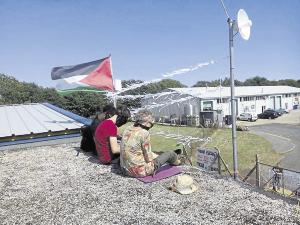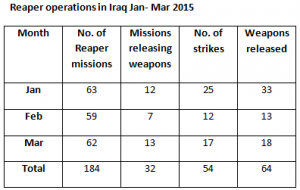‘Justice for the Elbit 5 — Stop Arming Israel’ demo at Aberporth test-flying site for UK-manufactured Israeli drones on 13 September. This action was in solidarity with five activists appearing before Cannock magistrates court, Staffordshire, charged under the Trade Union and Labour Relations (Consolidation) Act 1992 for their part in shutting down the Elbit drones factory in Shenstone on 6–7 July. Charges were dropped against three defendants, while the trial of the remaining two…
Drones & autonomous weapons
On a rainy day in June, police estimated that 2,000 people formed a human chain around USAF Ramstein in Germany, the headquarters of the US air force in Europe. The activists were protesting against the base’s critical role in transmitting information between operators in the United States and drones in Iraq, Afghanistan, Pakistan, Yemen and Syria.
Former US drone operator Brandon Bryant told Der Spiegel magazine in 2013 that Ramstein co-ordinated Washington’s global…
In September last year, Anna Jane Evans, Awel Irene, Angharad Tomos and Sian ap Gwynfor were convicted of criminal damage for painting ‘DIM ADAR ANGAU – NO DEATH DRONES’ on Llanbedr Airfield runway and ordered to pay £565 for cleaning the runway.
By the time of the deadline for the payment, contributions had poured in, as explained by Evans: ‘It is with great reluctance I am paying my share of what it cost to clean the runway. I have been overwhelmed by the number of people who…
On 20 October, after two days of evidence and legal argument, a judge in Lincoln magistrates court found four anti-drone protesters (Gary ‘Eagle Spits’ Eagling, Katha Karcher, Penny Walker and myself) guilty of criminal damage.
In January 2015, we entered RAF Waddington in order to disrupt ongoing British drone operations in Iraq and Syria. We knew that our presence would trigger a security alert that would put the base on ‘lockdown’ which (in the words of an RAF witness at our…
We Kill Because We Can is a 300-page rant on drones by cultural critic Laurie Calhoun. Focusing on the use of drones for targeted killing, each chapter is an angry polemical essay, with titles like ‘Strike First, Suppress Questions Later’ and ‘The New Banality of Killing’.
Calhoun argues that ‘both the practise of and propensity towards institutional killing has been transformed by this new technology.’ I agree. However I also have to admit that the tone of this book –…
The British defence secretary has given up on ‘innocent until proven guilty by a jury of peers’, and introduced a new legal principle: ‘innocent until the government believes you are likely to commit a crime’.
In an interview on Radio 4’s Today programme on 8 September 2015, Michael Fallon justified the killing by a British drone of two British citizens (Reyaad Khan and Ruhul Amin), and another unidentified man, by referring three times to the risk of a ‘likely’ terrorist…
The British defence secretary has given up on ‘innocent until proven guilty by a jury of peers’, and introduced a new legal principle: ‘innocent until the government believes you are likely to commit a crime’.
In an interview on Radio 4’s Today programme on 8 September 2015, Michael Fallon justified the killing by a British drone of two British citizens (Reyaad Khan and Ruhul Amin), and another unidentified man, by referring three times to the risk of a ‘likely’ terrorist attack:…
A year after the UK doubled its drone fleet, David Cameron visited RAF Waddington in Lincolnshire on 13 July to signal further commitment to – and spending on – military drone aircraft. The prime minister told the media that he had asked the military to look at how to do more to counter the threat posed by the jihadist group ISIS, including spending more…
The keynote speaker at ‘Drones and Forever War: Sharing information, building the campaign’ on 11 July was Chris Woods, author of Sudden Justice: America’s Secret Drone Wars.
The gathering, organised by the Drone Campaign Network, was a great opportunity for campaigners to update themselves on drone issues, to network and to plan campaigns.
Chris Woods charted the increase in the use of drones by the US, aided by US president Barack Obama’s enthusiasm for them…
This dense, complex history interweaves the political, legal and technical background to America’s use of lethal armed drones with the details of how drone operations work in practice.
It begins with the invention of modern drones, first used for surveillance during the (1991) Iraq war, and then fitted with armaments during the hunt for Osama bin Laden in 2001.
Since then, US targeted killings by armed drones have become more and more frequent not only in Afghanistan…
The British ministry of defence has concealed the details of one in five UK drone strikes in Iraq over the last six months, and held back all location information for two out of five drone strikes there.
Responding to a Freedom of Information (FoI) request from Drone Wars UK, the MoD reported that 202 British air strikes (by drones and by Tornado aircraft) targeted the ISIS insurgency in Iraq up until the end of March 2015. At least a further 32 strikes have taken place in April…
At the end of January, the prosecution dropped criminal charges against against nine London Palestine Action (LPA) activists who shut down a drones factory for two days last summer (see PN 2574–2575).
The Unmanned Aerial Vehicle (‘drone’) engine factory in Shenstone near Birmingham is owned by Israeli military technology firm Elbit Systems.
Lawyers for the defendants told Electronic Intifada that either Elbit or the UK government decided to withdraw…
21 March was ‘Fly Kites not drones’, organised by Voices for Creative Nonviolence UK. In Britain, kites were flown in Argyle, Axbridge, Bournemouth, Brighton, Dunblane, Edinburgh, Findhorn, Hastings, Liverpool, London, Loughborough, Manchester, Sheffield, Southampton, and Stockport.
On 19 March, giant books shut the main gate of the Hancock drone base in New York state, USA.
Seven members of the Upstate Coalition to Ground the Drones and End the Wars put up eight-foot-high copies of the UN Charter, Dirty Wars by Jeremy Scahill, Living Under Drones, and You Never Die Twice, the Reprieve report on drone warfare.
The seven were arrested and charged with trespass, disorderly conduct and obstructing governmental administration…
On 12 January, the secretary of state for defence, Michael Fallon, told the house of commons that there had been 99 UK airstrikes in Iraq since the beginning of the air campaign on 22 October. The following day, the ministry of defence (MoD) reported a further strike bringing the total to 100. By our calculations, using reports published by the MoD on their website, approximately one-third of the airstrikes have been carried out by the UK’s armed Reaper drones.
However, it appears…






